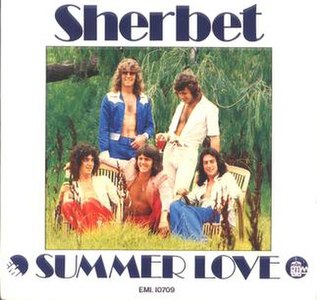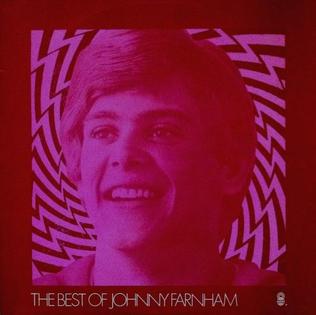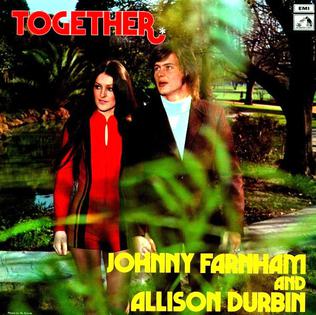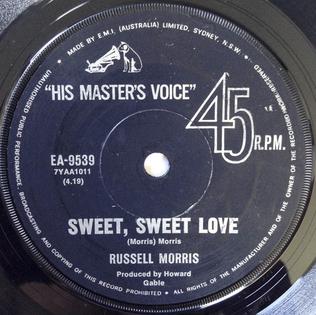Related Research Articles
Cheryl Lau Sang, known professionally as Samantha Sang, is an Australian singer. She had an earlier career as a teen singer under the stage name Cheryl Gray, before adopting the stage name she is more widely known as in 1969. She first received nationwide recognition in Australia in 1967, after releasing the top ten single "You Made Me What I Am".

"I Honestly Love You" is a song recorded by Olivia Newton-John and which in 1974 became a worldwide pop hit – her first number-one single in the United States and Canada. It remained her signature solo song until the 1981 hit "Physical". The single was first released in Australia as "I Love You, I Honestly Love You", as per its chorus.

"Better the Devil You Know" is a song by Australian singer and songwriter Kylie Minogue, taken from her third studio album Rhythm of Love (1990). The song was written and produced by Stock Aitken Waterman. The song was released as the album's lead single on 30 April 1990 by PWL and Mushroom Records. "Better the Devil You Know" is known as the song that re-invented Minogue with more sex appeal, as her previous albums were presented with her "girl next door" persona. Her music onwards presented a more independent approach.

"I Think I Love You" is a song composed by songwriter Tony Romeo in 1970. It was released as the debut single by The Partridge Family pop group, featuring David Cassidy on lead vocals and Shirley Jones on background vocals. The Partridge Family version was a number-one hit on the Billboard Hot 100 in November 1970. The alternative rock band Voice of the Beehive scored a hit version of their own in 1991. There have also been many other versions of this song from artists such as Perry Como, Kaci Battaglia and Katie Cassidy.

Make You Happy is a compilation album by Australian rock band Divinyls, which was released on October 21, 1997. It consists of material spanning from 1981 to 1993 including the hits "Boys in Town", "Science Fiction", "Pleasure and Pain" and their number-one signature song "I Touch Myself". The album's name comes from "I'll Make You Happy", the B-side of "Science Fiction" and a cover version of the 1960s track by The Easybeats. Track 20, "Love in Motion", is a 1992 rerecording of Icehouse's 1981 single with Divinyls' Christina Amphlett featuring on co-lead vocals.

So Lucky is the seventh studio album by Australian musician Renée Geyer. The album was released in November 1981 and includes Geyer's highest charting single "Say I Love You" which peaked at number 5 in Australia and number 1 in New Zealand.

"Summer Love" is a song by Australian pop group Sherbet which was released on 20 March 1975. It became their first number-one hit on the Australian Kent Music Report Singles Chart. The band had had a string of top 40 hits in the early 1970s with "Can You Feel It Baby" in 1971. "Summer Love" spent 2 weeks at number one in May 1975. The song was written by band members, Garth Porter and Clive Shakespeare. It was promoted on the newly aired ABC TV pop series, Countdown, which gave it wide exposure. From early 1975 the group made more appearances on the show than any other band in the programme's history. In October, at the King of Pop Awards, "Summer Love" won the Most Popular Australian Single, the band won Most Popular Australian Group and their lead singer, Daryl Braithwaite, won the King of Pop award.

"Knock, Knock Who's There?" is a song written and composed by John Carter and Geoff Stephens. It was originally sung and recorded by the Welsh singer Mary Hopkin and was the United Kingdom's entry at the Eurovision Song Contest 1970, where it came second. The single version was produced by Mickie Most and reached No. 2 on the UK charts.

"Hey There Lonely Girl" is a song recorded in 1963, titled "Hey There Lonely Boy" in its original version by Ruby and the Romantics. The group's original recording was a Top 30 hit, peaking at #27.. Unlike other Ruby and the Romantics releases, "Hey There Lonely Boy" did not make any other US chart.

The Best Of Johnny Farnham is the first compilation album by Australian singer Johnny Farnham, it was released on World Record Club in 1971. "Sadie " was first released in November 1967 and peaked at No. 1 on the Go-Set National Singles Charts for five weeks early in 1968. His cover of the B. J. Thomas hit "Raindrops Keep Fallin' on My Head" had been released in November 1969 and peaked at No. 1 for seven weeks in January–March 1970. The album cover was available in a variety of colours including orange, red and blue.

Together is a studio album of duets by Australian pop singers John Farnham and Allison Durbin, which was released on HMV for EMI Records in September 1971. It peaked at No. 20 on the Australian Go-Set's Albums Chart.

"Do You Know What I Mean" is a song written and performed by Lee Michaels. It reached #6 on the U.S. Billboard Hot 100 and #4 on the Cash Box Top 100 in the summer of 1971. The song was featured on his 1971 album, 5th.

"Sweet, Sweet Love" is a song written and recorded by Australian singer Russell Morris and produced by Howard Gable. It was released as the lead single from his debut album Bloodstone. It peaked at number 7 on the Australian Go-Set chart in July 1971; this becoming Morris' fourth top ten single.

"Listening" is the debut single from Australian pop group Pseudo Echo. The song was released in November 1983 as the lead single from their debut studio album, Autumnal Park (1984). The song peaked at number 4 on the Australian Kent Music Report. Following the international success of "Funky Town", a remixed version of "Listening" was released in 1987 for the movie "North Shore" starring Nia Peeples.

"A Beat for You" is a song by Australian pop group Pseudo Echo. The song was released in April 1984 as the second single from their debut studio album, Autumnal Park (1984). The song peaked at number 12 on the Australian Kent Music Report.

"I Could Make You Love Me" is a song from Australian pop group Wa Wa Nee. The song was released in August 1986 as the second single from their self-titled debut studio album. The song peaked at number 5 on the Australian singles chart.
"Falling in Love with Only You" is an pop song written and produced by Terry Britten and recorded by Australian pop singer Christie Allen. The song was released in March 1979 as the second single from Allen's debut studio album, Magic Rhythm (1979). The song peaked at number 20 on the Kent Music Report in Australia.
"Goosebumps" is an pop song written by Terry Britten and BA Robertson and originally released by Robertson in January 1979 as the first single from his debut album Initial Success. The single flopped, but later that year, Australian pop singer Christie Allen covered the song, which peaked at number 3 on Kent Music Report in Australia and sold over 60,000 copies
"He's My Number One" is a pop song written by Terry Britten and B. A. Robertson and recorded by Australian pop singer Christie Allen. The song was released in January 1980 as the fourth single from Allen's debut studio album, Magic Rhythm (1979). The song peaked at number 4 on the Kent Music Report in Australia.

"Magic Rhythm" is an pop song written by Terry Britten and B. A. Robertson and recorded by Australian pop singer Christie Allen. The song was released in May 1980 as the fifth and final single from Allen's debut studio album, Magic Rhythm (1979). The song peaked at number 38 on the Kent Music Report in Australia.
References
- ↑ Kent, David (1993). Australian Chart Book 1970–1992 . St Ives, NSW: Australian Chart Book. ISBN 0-646-11917-6. NOTE: Used for Australian Singles and Albums charting from 1970 until ARIA created their own charts in mid-1988.
| This 1970s pop song–related article is a stub. You can help Wikipedia by expanding it. |